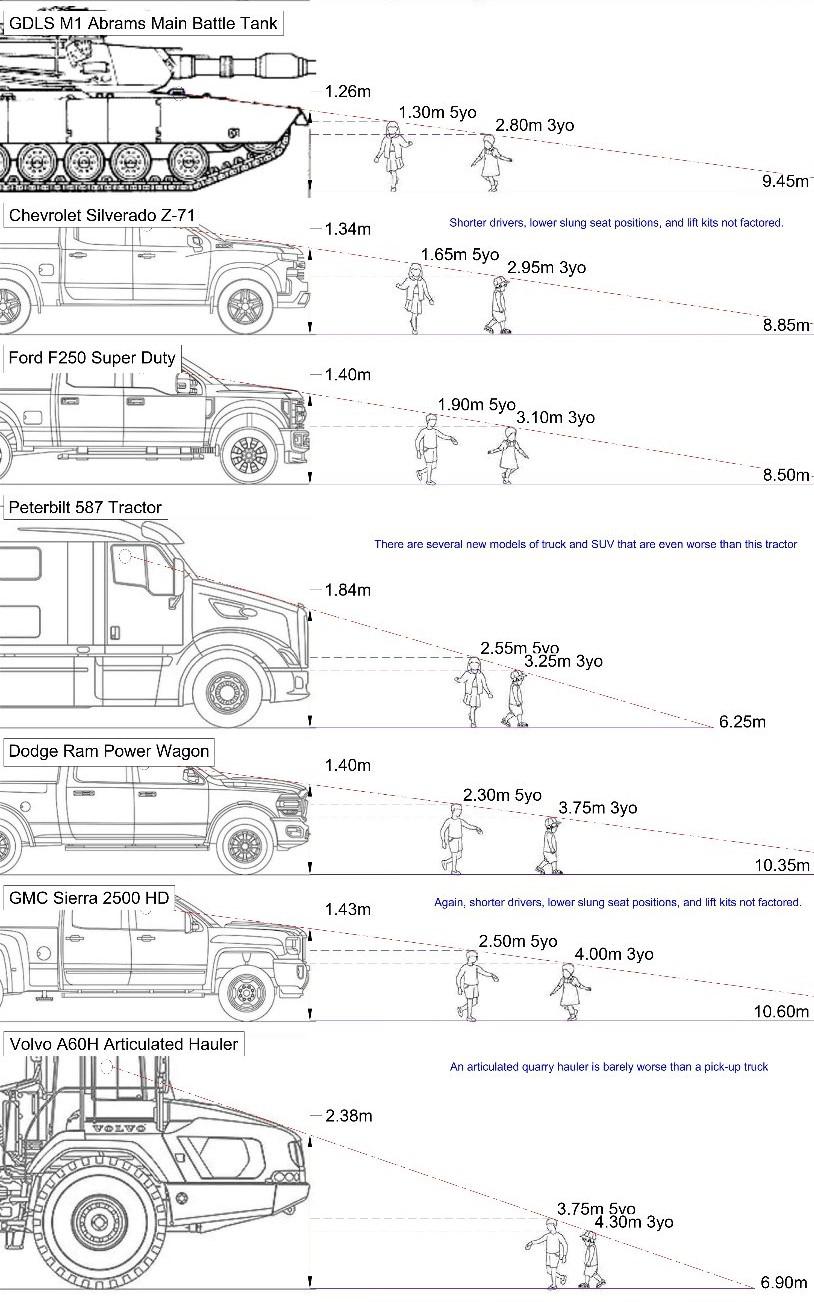- cross-posted to:
- [email protected]
- cross-posted to:
- [email protected]
Interesting article with some great linked research and practical solutions to the issue of traffic deaths.
Among other things:

Less visibility than a tank
I’m hoping dash cams also provide another route to feedback on poor behavior on the road. People can be and are responsive to social cues, but the ability to send them between vehicles is limited and people develop extremely selfish behavior in response.
The only good thing about it is that it does largely cut through other biases that people have. Women are not more vulnerable than men in their cars. Race usually isn’t the first salient thing drivers notice about other cars. But howdy do people like to walk that line of “rude but won’t quite cause a crash” on the road.
You’re Wrong About… (a great podcast) has an episode in which Michael Hobbes briefly mentions that he’s studying traffic death patterns, and that introduced me to the concept that everything is systemic. If there is any kind of pattern, that means a systemic cause exists somewhere. Anything with a systemic cause also has a systemic solution that can be implemented
Absolutely. One of my pet peeves is so many people complaining about irresponsible drivers. The drivers are a product of a system that allows and even encourages that type of behavior, and they will only change when the system changes. Irresponsible driving SHOULD bother you, but the solution is not to flip someone off or complain about that specific person. It’s to build streets, transit, and a legal system that will result in better and safer behavior.
Pretty much everywhere that has a vision zero program related to traffic incidents does it primarily through road engineering and developing alternate modes like public transit and bikeped.
Enforcement is only valuable when it’s fully passive and catches everyone - speed and red light cameras, license plate scanners for congestion charges, etc… This is true of any kind of enforcement response to try and reduce rates of bad behavior. Catching offenders doesn’t work as a deterrent unless most offenders think they will be caught.
And the bad drivers, the ones who people say shouldn’t have licenses because they’re not competent enough to control their vehicles… They probably wouldn’t be driving if they didn’t live in a society that required and encouraged they do so. In a normal, healthy culture, people usually don’t substantially prefer one mode over another. They just want whichever one effectively and affordably gets them to their destinations. With the average annual cost of car ownership over $11,000 in the US, it really isn’t very affordable already. But it’s the only effective way for most people to get around.
Car per Capita according to Wikipedia per 1000 person (world ranking)
USA: 831 (8) France : 668 (21) Japan: 624 (31)
Note: Top 6 countries are micro nations (under 90k population)
It’s more than just the abundance of cars, it’s also the absolute non-existence of any other transportation mode being supported. That’s also why we struggle so hard with DUI; in the US, if you’re not driving, you’re as good as fucking stranded. That’s not entirely true, you could gather your chutzpah and hike or bike however many miles with shitty, dangerous, or non-existent pedestrian infrastructure, or you might be lucky enough to be able to catch a bus or an Uber, but it’s not like Europe or Japan where everything’s dense enough that walking is actually practical. How real is it? Well, I’ve had three European and two Japanese exchange students and they’ve all said that the biggest culture shock was the loss of independence that came with suddenly being dependent on a car to go and do anything. That complete car dependence means that we have to have looser restrictions on our drivers so that people can go about their daily life. It means that we’ve got a lot of people driving who probably wouldn’t if they had some practical alternative; folks who probably treat it like a chore and aren’t as engaged with it as they should be.





